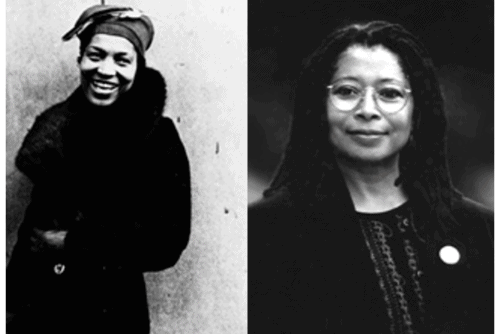Because of her association with Fannie Hurst, Zora also surged in popularity with her previously chilly classmates—some of whom had burst into unkind laughter upon hearing her, a black southerner, reciting French. Post-Hurst, Zora reported, “they don’t laugh in French when I recite, one of those laughers has asked to quiz with me.” Zora wanted to believe the laughter had stopped at least partly because her French had improved—not just because she had been hired by one of America’s favorite novelists. Of the laughers, she reasoned: “I knew getting mad would not help any, I had to get my lessons so well that their laughter we seem silly.”
Though Zora likely underestimated the role her impressive new job played in silencing her classmates’ laughter, she was right to take some credit for herself. For the first time in her life, she was competing academically with white students—young women who’d benefited from all sorts of preparatory advantages that simply were not available to her. Yet Zora performed as well as she had during her more attentive days at Howard, and as well as could be expected, considering her financial troubles. With a load of seven classes her first semester, she managed to earn Bs in English and history, and Cs in everything else, including French. She also got a booster shot of confidence: “You see,” she told Meyer, “being at Barnard and measuring arms with others known to be strong increases my self love and stiffens my spine.”
Zora’s job with Fannie Hurst was certainly a stabilizing factor during that first term at Barnard. The exact nature of the Hurst-Hurston financial arrangement remains a mystery, according to Fannie Hurst’s meticulous biographer, Brooke Kroeger. “Perhaps Zora bartered secretarial services for room and board. Perhaps Fannie paid part of the tuition debt, which Zora worked off in this manner. Maybe the deal was a straight salary-for-hours arrangement,” Kroeger speculated.
Though Zora Hurston and Fannie Hurst apparently never documented their fiscal relationship, they both chronicled their mutual affection easy to understand why they “took a shine” to each other right away, as Hurst put it. Both women were no doubt intrigued by the similarity of their surnames; this alone must have made them feel an immediate and curious kinship. A committed Negrotarian, Fannie Hurst—who kept in her home office a bulky file headed “Negro Matters”—often lent her name to various black organizations. One of her pet projects was the National Health Circle for Colored People, a nurses’ association for indigent black southerners. Hurst had become an active supporter of the health circle, and she had recently joined other prominent white literary figures in loudly lauding Harlem’s New Negro writers.
To Hurst, Zora Hurston seemed an especially worthy cause. Here was a talented young black woman who exhibited a “blazing zest for life,” as Hurst later recalled. Zora seemed “awash in splendor,” and the well-off Hurst was more than willing to be of service to an emerging black female author gleaming with such potential.
Hurst was only five years older than Hurston, but because both women lied about their ages, they each assumed the gap was much wider. And Zora gladly played the role of brilliant young protégée to Fannie’s role as older, wiser mentor.
With her keen nose for opportunity, Zora immediately grasped the importance of nurturing a relationship with Fannie Hurst, who was, in Zora’s words, “a great artist and globe famous.” Hurst was indeed a bona fide celebrity. A best-selling author, highly paid screenwriter, frequent radio guest, newspaper columnist, and popular magazine writer (for McCall’s, Cosmopolitan, and Harper’s Bazaar, among others), Hurst was in a position to open doors for Zora that few others could. And she had a bold sense of style that Zora found appealing. “She knows exactly what goes with her very white skin, black hair and sloe eyes, and she wears it,” Zora noted of Hurst, whom she once called “a stunning wench.” “I doubt if any woman on earth has gotten better effects than she has with black, white and red. Not only that, she knows how to parade it when she gets it on. She will never be jailed for uglying up a town.”
The fondness Zora and Fannie felt for each other lasted long after their formal financial arrangement ended. In fact, Zora’s stint as Hurst’s secretary was remarkably short-lived—mercifully so, both women might have agreed. Hurst found Zora’s secretarial skills atrocious: “Her shorthand was short on legibility, her typing hit-or-miss, mostly the latter, her filing a game of find-the-thimble,” Hurst later recalled. For her part, Zora was happy to be relieved of her secretarial duties, particularly typing. “My idea of Hell is that I would all through eternity be typing a book,” she told a friend years later.
In early December—after just a month as Fannie Hurst’s live-in secretary—Zora moved out, taking a room on West 131st Street in-Harlem. “Though the myth holds otherwise,” Hurst’s biographer concluded, “the month between November 4 and December 6, 1925 seems to have been the full extent of Zora’s tenure in an early-day work-study arrangement at the home office of Fannie Hurst.”
The women’s friendly relationship was by now firmly established, however, and Zora continued to reap the benefits of their ongoing association. Fannie Hurst, it seemed, was Zora’s passport to social success among her elite classmates. “The girls at Barnard are perfectly wonderful to me,” Zora reported to Meyer a week after she’d moved out of Hurst’s apartment. “They literally drag me to the teas on Wednesdays and then behave as if I am the guest of honor—so eager are they to assure me that I am desired there.”
She added: “They have urged me to come to the Junior prom at the Ritz-Carlton in Feb. and several girls have offered to exchange dances with me if I will bring a man as light as myself.” Rather than take offense on her darker-skinned brethren, Zora (at least in her letter to Meyer) laughed off her classmates’ color-struck racism: “Their frankness on that score is amusing, but not offensive in that dancing is such an intimate thing that it is not unreasonable for a girl to say who she wishes to do it with.” On Meyer’s advice, Zora decided not to further upset Barnard’s status quo by attempting to integrate the prom. “But even if things were different,” she judged, “I could not go. Paying $12.50 plus a new frock and shoes and a wrap and all the other things necessary is not my idea of a good time. I am not that ‘Ritzy’ yet.”
Being the only black person at a party (other than her date) was not Zora’s idea of a good time, either. She knew it would only make her feel conspicuously black and intractably different. Not inferior. Just different, and apart. This was something Zora felt often enough in her academic life to know she did not wish to seek it out in her social life. “I feel most colored when I am thrown against a sharp white background,” she once noted. This was, of course, her everyday experience at Barnard: “Among the thousand white persons, I am a dark rock surged upon, overswept by a creamy sea. I am surged upon and overswept, but through it all, I remain myself.” And that self preferred a Harlem rent party to a formal dance at the Ritz any day of the week.
Still, even among her black friends, Zora expressed satisfaction with the way Barnard was treating her. “I suppose you want to know how this little piece of darkish meat feels at Barnard,” she playfully wrote to Constance Sheen, the sister of her still-long-distance sweetheart, Herbert Sheen. “I am received quite well,” Zora bragged. “In fact I am received so well that if someone would come along and try to turn me white I’d be quite peevish at them.”
Pursued by the student government president as well as “the Social Register crowd,” Zora became “Barnard’s sacred black cow,” as she put it. She knew she had Fannie Hurst to thank for her fast ascent to fashionableness, and she did: “Partly because you took me under your shelter, I have had no trouble in making friends,” she wrote to Hurst. “Your friendship was a tremendous help to me at a critical time. It made both faculty and students see me when I needed seeing.”
Hurst offered other support as well, agreeing to take two of Zora’s articles and a short story on rounds to the magazine editors with whom she was so well-connected. As Zora’s would-be mentor, Hurst also suggested some changes to the short story, which Zora made reluctantly. “I do not wish to become Hurstized,” Zora complained to Meyer. “There would be no point in my being an imitation Fannie Hurst, however faithful the copy, while the world has the real article at hand.” Yet Zora knew she could not afford to balk too loudly: “I am very eager to make my bow to the market, and she says she will do all she can for me with her editors. Victory, O Lord!”
In addition to acquainting editors with Zora’s work, Hurst introduced her Negro protégée to some of her celebrity friends. At a December 19 party at Fannie’s home, for example, Zora shared a box of matches with Fannie, explorer Vilhjalmur Stefansson and novelist Charles Norris. She sent the empty matchbox to Constance Sheen—a Fannie Hurst fan—as a souvenir.
Zora was not entirely seduced by her heady company, however. “They are OFTEN insincere,” she said of her new celebrity acquaintances. “Their show of friendship mere patronage.” Zora sensed that this moment in history—when budding black writers like herself were so welcomed by the mainstream literati—would be fleeting. “I know it won’t last always,” she told Constance Sheen, “so I am playing with my toy while I may.”
No longer on Hurst’s payroll, Zora found another way to eke out an income—by working part-time as a waitress at private dinners and doing some housekeeping work, often for friends of Meyer’s. At the same time, Zora was continuing to write. In late 1925, she penned a satirical essay, called “The Emperor Effaces Himself,” about Marcus Garvey’s imprisonment in February 1925 on a mail-fraud conviction. Though the piece was never published, it was an early example of Hurston’s ability to use biting satire to great effect, as well as an example of her impatience with “race leaders” of dubious moral character. With his “wealth of titles,” Garvey “had taken the people’s money and he was keeping it,” Hurston wrote. “That was how he had become the greatest man of his race. Booker T. Washington had achieved some local notice for collecting monies and spending it on a Negro school. It had never occurred to him to keep it. Marcus Garvey was much in advance of the old school of thinkers,” she wrote mordantly.



